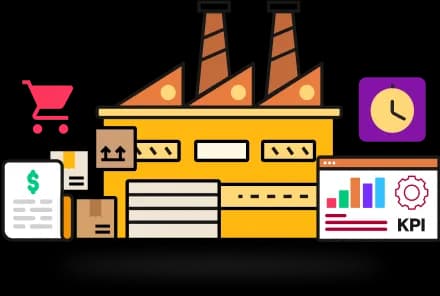Industry
Industrial Manufacturing
High Tech & Electronics
Footwear Manufacturing
Apparel & Textiles
Food & Beverage
Rubber & Plastics
Metal Fabrication
Industrial Machinery & Equipment
Construction & Engineering
Furnitures & Fixtures
Medical Device Manufacturing
Automotive Manufacturing
Aerospace And Defence
Screw Shop Manufacturing
Spring Shop Manufacturing
Solutions
Pricing
Resources
Company
GST Legacy
GST Impact on FMCG Sector
The Fast Moving Consumer Goods (FMCG) are popularly named as consumer packaged goods. Items in this category include all consumables other than groceries or pulses people buy at regular intervals. FMCG is one of the fastest growing sectors among all the sectors in the Indian economy. The Indian FMCG sector includes 50% of the food and beverage industry and 30% from personal and household care.
The new Goods and Services Tax (GST) regime will bring several benefits for the economy, and could particularly vitalize the FMCG industry. There is also a silver lining for FMCG companies in the country under GST. Earlier, distribution costs accounted for 2-7% of the turnover for these companies. The FMCG companies set up warehouses covering every state, engaging stock transfers among them, which in turn facilitate selling of goods to distributors locally. Usually, warehouses are set up in states where the effective taxation is low. With GST, they can put up storage facilities wherever they want without any difficulty.
Post GST, the tax rate for the FMCG industry is 18-20%. It is welcomed by all the major players in the FMCG industry. Under GST, input credit is available for all the GST payments made in the course of business.
The FMCG sector benefits from GST in the form of saving a considerable amount of logistics expenses. The distribution cost of the FMCG sector was 2-7% of the total cost earlier, which dropped to 1.5% post GST implementation. Under the GST regime, there will be a cost reduction in terms of transportation and storage of goods due to smoother supply chain management, tax payment, input credit claim, and CST removal. This leads to make the consumer goods cheaper.
Stock transfers outside the State will be subjected to GST. GST valuation rules provide that if the transaction value is not available then the value for the good or service will be considered as the transaction value of good or service of same kind and quality.
GST Rate on FMCG
The GST rates for all different goods or products under the FMCG has been announced by the Indian Government. Most of the products or goods have been categorized under the tax brackets as expected by the FMCG industry experts.
Basic food products such as milk, rice, wheat and fresh vegetables have been kept under the NIL bracket which is in line with the expectation from the FMCG experts. Paneer branded and sold like mother dairy paneer or Nestle Paneer and Frozen vegetables have been kept under the 5% bracket which would be largely neutral.
Products like butter, cheese and ghee are expensive under GST as they are placed in the 12% bracket. Gifting dry fruits at the time of Diwali is going to be more expensive as dry fruits have been placed under the 12% bracket under GST law.
Items like toothpaste, soaps, hair oil – have been put under the 18% tax slab. This is in accordance with the government’s viewpoint of keeping tax rates low for mass consumption products. In reality, the GST rate schedule shows that approximately 81% of all items are in the 18% tax bracket or below. The remaining 19% fall in the 28% tax slab.
The FMCG sector is very pleased with the rates announced under GST law for FMCG products. The FMCG industry is going to benefit from the lower logistics cost and better competitive market and rates for most of the products being kept under the expected tax bracket.
Adversely Impacted Firms
Unexpectedly, some of the widely consumed products have been placed under the highest tax slab of 28%. Higher tax rate for detergents and shampoo is a real dampener since these are daily-use, mass consumption items.
The items belonging to the premium category have been mostly put under the highest tax slab of 28%. These include aerated drinks, health supplements, liquid soap, and skin care. This is not going to impact negatively on manufacturers as they had been paying similar taxes earlier.
Ayurvedic products are taxed at 12%, slightly higher than the prevailing rate. This upsets Dabur, which has a wide portfolio of ayurvedic products. Ayurvedic players were expecting the tax rate to go down, given the government’s shove on popularizing traditional Indian medicine.
The structure of GST rate is likely to see a mixed impact. For instance, in case of HUL, the tax incidence has reduced for soap, toothpaste and tea, but increased for detergent, shampoo and skin care; whereas for Godrej consumer products, the lower tax incidence on soaps and insecticides is good, but higher tax rate for hair dye is a bad.
Conclusion
The GST has an impact on every facet of the business operations and therefore it requires a ‘whole of business’ approach to ensure a smooth transition. If you would like to know more about GST with Deskera, please write to hello@deskera.in
Get Started with Deskera
Benefits of cloud business software
- Productivity
- Implementation
- Mobility
- Scalability
- Security
See related articles about India GST
What our Customers Say About Us
Whatever your business
size, Deskera enables you to
simplify operations across
business functions. Here's
what our customers say
about us.


At GoDo, we understand that managing our finances and customer relationships is essential for our success. Deskera has provided us with an easy to use and intuitive platform that has enabled us to access our financial data, track customer relationships, and manage our finances with ease. We have been able to streamline our processes, better manage our finances, and stay on top of our customer relationships. We highly recommend Deskera to any business that is looking to stay organized and efficient.
Wesley Wright
CEO, GoDo Life


We are extremely pleased with our decision to switch to Deskera and have seen a significant improvement in our business operations since making the switch. The sales process was smooth from start to finish and customer support at every step of the implementation was stellar. Highly recommend Deskera to those looking for a great ERP solution.
Wally Mears
CEO, The Jungle

We implemented Deskera's integrated platform to improve our procurement and inventory management processes to streamline our operations and improve efficiencies. I highly recommend their platform to any company looking to accelerate their growth.
Scott Phetsalod
Laboratory Manager
Run Your Business With Deskera

Products
Use Cases
 , India
, India  , Singapore
, Singapore  , and Canada
, and Canada  with
with 


